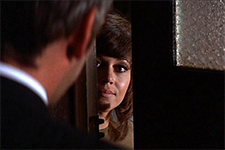Klute
|  Alan J. Pakula’s Klute is really two different films operating simultaneously, one of which is a near masterpiece and the other of which is mediocre at best. The first film is an intense character study of a smart, tough, but paranoid New York call girl named Bree Daniels, played in an Oscar-winning turn by Jane Fonda. Bree is caught up in a missing-persons case, the unfolding plot of which comprises the second, decidedly lesser, film, which is what brings her into contact with the film’s title character, John Klute (Donald Sutherland), a private detective hired to locate a Pennsylvania business executive who has disappeared. The fact that the film is called Klute would suggest that it is somehow about Sutherland’s character, but it isn’t at all. In fact, Klute is a decidedly uninteresting character, even though he’s played by an incredibly interesting actor near the height of his career (Sutherland had just starred in Robert Altman’s subversive military farce M*A*S*H [1970] and he would soon appear in Nicolas Roeg’s horror masterpiece Don’t Look Now [1973]). If screenwriters Andy and Dave Lewis, TV veterans who had worked together primarily on Westerns such as Destry, Outlaws, and 12 O’Clock High (although they also penned an episode of Kraft Suspense Theatre), had been honest, they would have titled the film Bree, and perhaps it is evidence of Jane Fonda’s deep involvement in the production that her character is the film’s real heart and soul. To prepare for the role, Fonda spent a week with New York City call girls and their pimps, and at one point she lost her confidence and tried to get Pakula to let her out of her contract. Thankfully, that did not happen, as Fonda delivers a truly lived-in performance as a woman who is deeply insecure and fearful (possibly for good reason), but is so good at hiding it that no one would ever know except the therapist she regularly sees. As New Yorker critic Pauline Kael noted, “this is perhaps the first major attempt to transform modern clinical understanding into human understanding and dramatic meaning.” While the plot mechanics work along the well-worn gears of any number of mystery-thrillers, the film catches and holds us because Bree is such a fascinating, enigmatic character. At turns tough and fearful, manipulative and vulnerable, she is a mercurial figure who draws us in because Fonda makes her feel so indelibly real. We see her come to life when she’s with a client, particularly in an early scene in a hotel room with a Chicago businessman who is clearly nervous; at these moments, she is in control, calling the shots, running the show, and it brings her to life even though she’s faking everything. It is no surprise that she wants to be an actress, and we see going through the wringer of auditions and modeling calls, the latter of which finds her lined up against a wall with a dozen other beautiful women being nitpicked by a trio of men who find fault in her hands. In moments like these we see her vulnerable, trapped, made small by people around her who only see her as an object; at other times, though, she is wily and even viciously manipulative, using the very assets for which she is objectified to control those around her, including the naïve Klute. Klute was Pakula’s second film, following the gentle, oddball romance The Sterile Cuckoo (1969), although he had been producing films for director Robert Mulligan since the late 1950s, including To Kill a Mockingbird (1962). Klute was the first film in his “paranoia trilogy,” which also included The Parallax View (1974) and All the President’s Men (1976). Just as Arthur Penn had his finger on the pulse of the late 1960s zeitgeist in films like Bonnie and Clyde (1967) and Alice’s Restaurant (1969), Pakula had a firm grasp on the creeping tensions and fears of the Watergate era. Despite its lukewarm mystery plot, Klute is a powerful portrait of the allure and danger of the anonymous big city, as Bree fears that she is being watched and stalked and recorded—and maybe she is. The paranoia is gripping because it feels justified, and it plays into the duality of Bree’s character as both independent women who controls her own fate and potential victim always looking over her shoulder. We may forget the details of the plot, but Fonda’s performance is one for the ages.
Copyright © 2019 James Kendrick Thoughts? E-mail James Kendrick All images copyright © Warner Bros. / The Criterion Collection | |||||||||||||||||||||||||||||||
Overall Rating: 

 (3)
(3)

